The bags, which are available for customers to use in the fruit and veg section, will cost one cent in Germany from this summer onwards – a “symbolic fee” aimed at encouraging people to cut down on plastic bag usage, the firm said on Tuesday.
Meanwhile, the bags will also soon be made of renewable raw materials in a bid to make them more environmentally friendly.
Furthermore, the discount chain, which is made up of two groups – Aldi Nord and Aldi Süd – will be offering reusable nets as an alternative for consumers to bag up their fruit and veg from autumn this year.
Even though customers in supermarkets across Germany now have to pay for plastic carrier bags, the thin bags for fruit and veg have so far been free of charge.
But this will likely change in future as supermarkets look at how to cut down further on plastic waste.
Three billion thin plastic bags
The consumption of plastic carrier bags, which retailers sell at the checkout for a fee, has fallen by two thirds in the last three years.
Last year, plastic bag use in Germany stood on average at 24 bags per person – or five fewer than in the previous year, according to the Gesellschaft für Verpackungsmarktforschung (Society for Packaging Market Research).
READ ALSO: Are plastic bags on the way out in Germany?
 Aldi will offer nets for fruit and veg in future. Photo: DPA
Aldi will offer nets for fruit and veg in future. Photo: DPA
“The Germans are increasingly shying away from plastic bags,” Federal Environment Minister Svenja Schulze (SPD) previously told DPA. The figures represent a large dip from 2016, when usage was still at 45 bags per capita.
But customers in Germany used more than three billion of the thin plastic bags for fruit and vegetables last year, the Federal Environment Ministry said.
That is equal to 37 bags per person, slightly more than in 2015 or 2016.
“The figures confirm that the pricing of plastic bags has visibly prompted consumers to rethink,” said Kristina Bell, group buying director for quality assurance and corporate responsibility at Aldi Süd.
“We are following a similar principle with the symbolic cent for our disposable fruit and vegetable bags,” she added. “We would be delighted if other retailers joined us, because it’s only with an industry-wide solution that we can take a big step forward in reducing plastic bag usage.”
READ ALSO: How Germany's environment minister plans to turn around plastic use
Reducing plastic consumption
Aldi plans to have the fruit and veg bags, which will be subject to the small fee, made from biodegradable plastics from this summer onwards.
As an alternative, the chain plans to sell nets for fruit and vegetables from autumn, which customers can reuse. Other retail chains also offer these washable nets.
Supermarkets have been increasingly trying to think of ways to reduce their plastic consumption.
Both Aldi chains banned plastic crockery, straws and plastic cups from their stores at the beginning of the year. Since March, the discounter has also got rid of plastic packaging for cucumbers.
Aldi announced last summer that they intend to use 30 percent less plastic in the packaging of their private label products by 2025.
By 2022, consumers will be able to recycle all label packaging, they said.



 Please whitelist us to continue reading.
Please whitelist us to continue reading.
Rewe has been using the net bags for some time – they cost €2 for 4 bags.